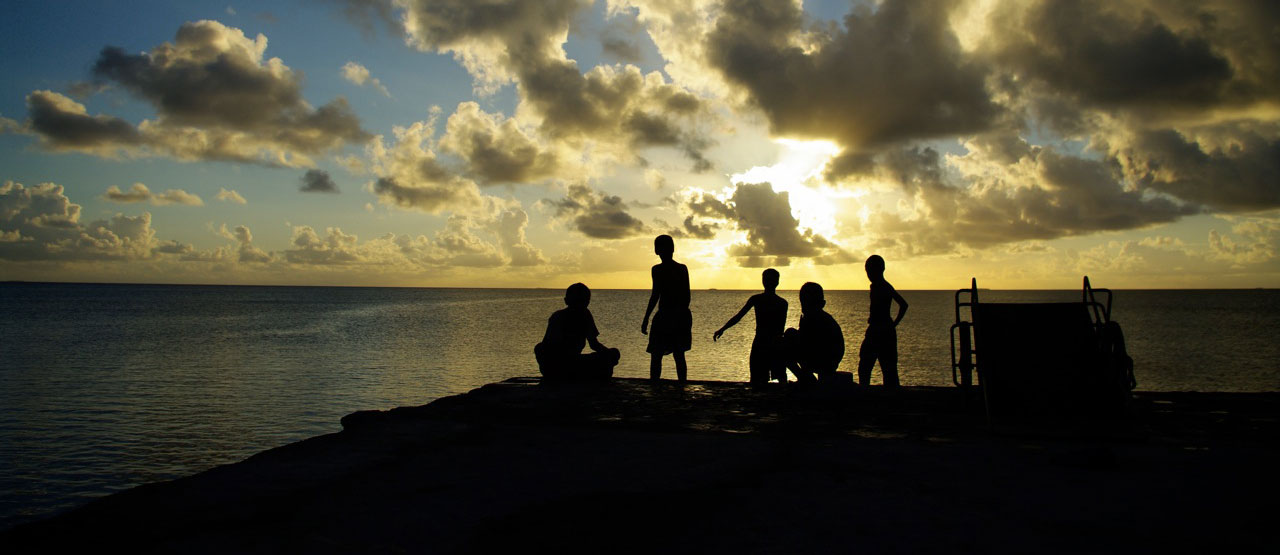Tuvalu is sinking. It’s slowly but steadily being swallowed by the Pacific Ocean and will most likely be uninhabitable by 2100. Although there is a campaign to save Tuvalu from disappearing under the ocean water and to preserve its cultural legacy in the digital world, the fate of this small island nation is raising an important question that underscores the significance of an open, global Internet: What happens when you can neither physically nor digitally reach a country?
But let’s back it up a little bit—what and where is Tuvalu? Tuvalu is a small island country made up of nine coral atolls and islands located in the central part of the Pacific Ocean. It’s one of the world’s smallest and least populous nations. The country is situated between Australia and Hawaii and has a complex history of colonization, occupation, and bombing by different countries, starting in the 16th century through to World War II, until it finally regained its independence in 1978.
Due to its low-lying nature and limited land area, Tuvalu is particularly vulnerable to the impacts of climate change, including rising sea levels and extreme weather events. Its economy primarily relies on subsistence farming, fishing, and remittances from Tuvaluans working abroad. Still, the country’s small size and geographical isolation pose challenges in terms of economic development and sustainability.
As a result of this sinking process, Tuvalu’s government is negotiating the relocation of its population with different governments around the world.
The Digital Nation of Tuvalu
Few other nations have a relationship with the Internet as unique as Tuvalu. From how the Internet has supplemented Tuvalu’s economy to how Tuvalu is using it in novel ways, the Internet is of major importance to this nation.
.tv TLD
Tuvalu owns the ‘.tv’ top-level domain registry, which is managed by a company called GoDaddy. The popularity of the .tv domain is due to its association with the abbreviation for “television” which has turned it into an important source of revenue. Thanks to streaming sites that use .tv, like Twitch.tv, Tuvalu has found a completely new source of national income to rely on.
Preserving Tuvalu Online
While its physical land is slowly disappearing into the Pacific, Tuvalu is on its way to becoming the world’s first digital nation. In an effort to preserve the Tuvaluan landscape, identity, culture, and heritage, the country is undergoing a digitalization process. It is recording and registering every possible aspect from biodiversity to music and cuisine, and uploading it to the Internet where the remote nation can safeguard its cultural legacy forever. If the sinking can’t be stopped, then the effort will preserve Tuvalu’s cultural footprint for Tuvaluans living elsewhere—a nation without a land.
Will Tuvalu Sink Twice?
The intention behind Tuvalu becoming a digital nation is to keep its cultural heritage—its footprint in human history—alive in cyberspace and “safe” from the physical threats the country and its people must endure. But online, the looming threat of Internet fragmentation could lead to Tuvalu “sinking” again.
Internet fragmentation is a very real threat and it can shatter the Internet we all use and love into smaller isolated networks, and limit access to content, websites, apps, and services depending on who we are or where we are. Another way of seeing it is that Internet fragmentation could make some things inaccessible and invisible.
Internet shutdowns lead to fragmentation by restricting or shutting off access to the Internet either partially or completely. But shutdowns not only cut regions off from the Internet, they also cut the world off from that region. On the Internet, where networks and services are interconnected, networks are affected by one another, and web services use back-end components based in multiple geographies. So even a website—in this case digital Tuvalu—outside the area could be affected by the shutdown.
Tuvaluan diaspora and other users in the shutdown area may be unable to reach www.tuvalu.tv. For those users, it would be as though the digital Tuvalu nation no longer exists. For the whole world, it may appear as though the digital nation was removed from the Internet if the hosting server is prevented from connecting to the Internet.
The Tuvalu digital nation is also vulnerable to other countries’ decisions as to what content is allowed on the Internet. It’s not hard to imagine a government that wants to censor content about climate change, global warming, and sea level rises blocking or otherwise preventing users in its country from accessing www.tuvalu.tv or even requiring DNS resolvers providing services in their country from blocking access for all users all over the world.
Any policies, laws, and technical or commercial decisions that disrupt the global Internet pose a serious risk to the future of Tuvalu’s digital and cultural heritage.
Few things can match the tragedy of Tuvalu sinking. The disappearance of a people’s homeland is dreadful; the effort to preserve its cultural legacy in the digital world is heroic.
Humanity has failed Tuvalu and its people before, in this case, by neglecting to prevent global warming. Will we fail them twice making their cultural legacy submerge under a digital ocean?
Learn more about the Internet fragmentation threats that impact us all.
Image copyright: Tuvalu © INABA Tomoaki CC BY-SA-2.0

